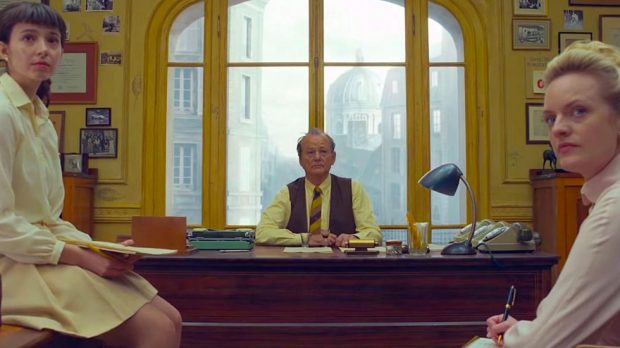
Directed by Wes Anderson
Starring Benicio del Toro, Adrien Brody, Timothée Chalamet, Frances McDormand, Bill Murray
If you like Wes Anderson films, you should see this. If you don’t like Wes Anderson films, you shouldn’t see this. It’s un film de Wes Anderson to a T, complete with dry, witty dialogue and very stylised set-ups and framings within every single shot, meaning that this is more of the same from him (but the same is quite good).
The French Dispatch is an anthology film, looking at the three different back-stories of three articles written for the titular journal. The first looks at prisoner Moses (Benicio del Toro) who has his artwork commissioned by art dealer Julien (Adrien Brody), though his newest eagerly awaited work ends up on a surprising canvas. The second observes young revolutionary/chess-player Zeffirelli (Timothée Chalamet) who has help writing his manifesto (and help with his love-making skills) from journalist Lucinda (Frances McDormand). The third has its food critic (Jeffrey Wright) involved with the kidnapping of the son of a police senior (Mathieu Amalric).
Anderson feels no need to hold back on his own brand of cinematic trickery and magic. The film swiftly transitions from one timeline to another, one person’s telling of a story to another, accompanied by changing aspect ratios, going from monochrome to colour, and even a comic-book animation in the exciting finale of the third story. Anderson uses a wealth of techniques, and there’s never the feeling he’s overdoing it or doing it for cheap thrills. He explored the nature of stories in The Grand Budapest Hotel and identified each different story with a different aspect ratio. He does it similarly here, using these techniques to not only differentiate the stories within stories, but for dramatic effect.
It’s nothing new or fresh within Anderson’s oeuvre, feeling like more of the same – but you can’t complain too much if the same is still good. Anderson, like any other film he’s made, is still demonstrating how much he can push at the boundaries of how to use the film form to tell your story and frame your shots. The emotional dryness is also still there, stifling quite a lot of any sentimentality, but there’s still an undeniable craft with each character, in how they’re written, acted, and uniquely placed within such a story.
DAVID MORGAN-BROWN